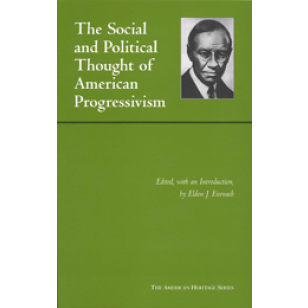The Social and Political Thought of American Progressivism
"Eldon Eisenach, one of the most perceptive scholars of American progressivism, has brought together in this fine collection both standard and unfamiliar sources that will give historians, political scientists, and their undergraduate and graduate students access to a wide range of voices from—and reliable guidance to the voluminous secondary sources on—the era of progressive reform."
—James Kloppenberg, Harvard University
eBook available for $8.00. Click HERE for more information.
Through a variety of primary sources—including speeches, poems, magazine articles, and book excerpts—this collection illustrates the origins, ambitions, and political legacy of the American Progressivism movement (1886–1924). A general introduction offers a history of the movement and a brief discussion of recent historiographical debates; headnotes introduce each selection and provide historical and political context.
Reviews:
"Eldon Eisenach, one of the most perceptive scholars of American progressivism, has brought together in this fine collection both standard and unfamiliar sources that will give historians, political scientists, and their undergraduate and graduate students access to a wide range of voices from—and reliable guidance to the voluminous secondary sources on—the era of progressive reform."
—James Kloppenberg, Harvard University
". . . Eisenach has assembled an impressive collection of primary sources . . . that leaves readers with a good sense of the movement, the ideas, and the people who come with the label 'Progressive.' . . .The beauty of Eisenach's book is that he lets the Progressives speak for themselves. . . . His introductory remarks to each section are excellent, as are his offerings of further readings. That his selections are able to speak to the complexity of the times without reducing or overly simplifying his or their arguments is also of note. . . . Thus, this book is perfect for both the bookshelves and the classroom."
—Jason S. Lantzer, Indiana University-Indianapolis, for H-Net Reviews
"The Introduction to this collection opens by warning us that 'It is important to understand Progressivism…correctly.' No scholar is better poised than Professor Eisenach to help us do just that; students of the Progressive Era are familiar with and indebted to his remarkable thinking and scholarship about the period. In The Social and Political Thought of American Progressivism, Eisenach has used his great understanding to bring together in one volume a series of well chosen and helpfully organized selections of Progressive writings to display the breadth, complexity, and depth of the thought from this era. Students and teachers of American politics and history will benefit greatly from this collection, as they will from the author's illuminating introductory materials and excellent bibliographies.
—Robert Pepperman Taylor, University of Vermont
"A fine—and much needed—collection."
—Robert Westbrook, University of Rochester
Contents:
Introduction.
Chapter 1: A Preface to Progressivism:
1. Progressive Democracy, David Francis Bacon.
2. On Lincoln, Herbert Croly.
3. Lincoln, John S. Phillips.
4. On the Civil War, Vida Dutton Scudder.
5. The Influence of Lincoln, Jane Addams.
Chapter 2: A Democratic People with Common National Goals:
6. The American Democracy and Its National Principle, Herbert Croly.
7. The Bonds of Nationality, Albion Small.
8. The New State, Mary Parker Follett.
Chapter 3: The New Social and Political Economy:
9. The Establishment of the American Economic Association, Richard Ely.
10. The New Economics, John Bates Clark.
11. The Evolution of Industrial Society, Richard Ely.
12. Social Gradations of Capital, Albion Small.
13. Economics and the New Basis of Civilization, Simon N. Patten.
Chapter 4: Creating an Ethic of Interconnectedness and a Democratic Public:
14. Democratic Ethics, John Dewey.
15. The Subjective Necessity of Social Settlements, Jane Addams.
16. Democracy and Social Organization, Franklin Giddings.
17. The Democratic Mind, Charles Horton Cooley.
18. Public Opinion and Social Control, Edward Alsworth Ross.
19. Training Democratic Citizens, Mary Parker Follett.
Chapter 5: The Law, the State, and the Economy:
20. The State and Large Business Corporations, Albion Small.
21. Economics and Jurisprudence, Henry Carter Adams.
22. The People and the Law, Herbert Croly.
23. Sociological Jurisprudence, Roscoe Pound.
24. Pragmatic Method and the Law, John Dewey.
Chapter 6: The Labor Question:
26. A Programme for Labor Reform, Richard Ely and Seth Low.
27. Economic Surplus and the Rights of Labor, Simon N. Patten.
28. Ethical Gains through Labor Legislation, Florence Kelley.
29. Labor Unions, Herbert Croly.
Chapter 7: The Social Gospel and Social Christianity:
29. The Christian State, Samuel Zane Batten.
30. The Christian Society, George D. Herron.
31. Christianity and the Social Crisis, Walter Rauschenbusch.
32. The Federal Council of Churches Social Program.
Chapter 8: Women and Families in the New Society:
33. Women in Evolutionary Economics, Charlotte Perkins Gilman.
34. The Democratic Household, Jane Addams.
35. The Marriage of Democracy and Christianity, Vida Dutton Scudder.
36. Legislative Emancipation, Florence Kelley.
Chapter 9: Progressivism Triumphant in America:
37. The New Democracy, Walter Weyl.
38. Drift and Mastery, Walter Lippmann.
39. The Progressive Movement, Benjamin Parke De Witt.
40. The Progressive Party Platform.
Chapter 10: American Progressivism Triumphant in the World:
41. The Americanization of the World, William T. Stead.
42. Patriotism and Religion, Shailer Mathews.
43. The World State, Mary Parker Follett.
Index.
Acknowledgments.
About the Author:
Eldon J. Eisenach is Professor of Political Science, University of Tulsa.

